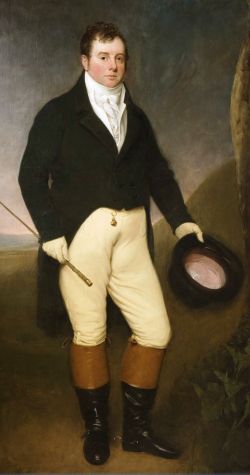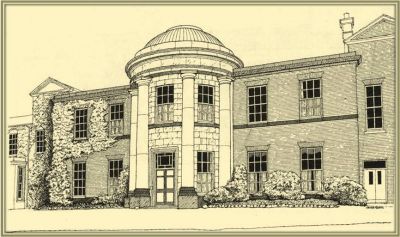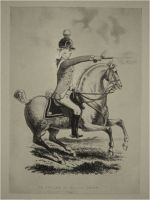- History
- Pottery
- Industry
Josiah Spode II: from potter to landed gentry
 Portrait of Josiah Spode II, aritst unknown The Potteries Museum & Art Gallery, Stoke-on-Trent |
Josiah Spode II decided to return to Staffordshire and take on his father’s factory. He left his retail warehouse in William Copeland's steady hands. On returning to Staffordshire, Josiah Spode II may have briefly lived at Fenton Hall, once owned by his father's former employer. But he soon acquired an estate and began building his own large, elegant house.
He built The Mountat Penkhull, on top of the hill overlooking the town of Stoke-upon-Trent and the Spode factory. It was finished in 1804, and Josiah II moved in with those of his children who lived in Staffordshire. About the same time he built terraces and a courtyard of houses for workers.
Josiah Spode III, third generation of the Spode pottery dynasty, had lived most of his life in Staffordshire with his grandparents. He attended local schools and trained with Josiah I, presumably with a view to continuing the family management of the potworks. Following his grandfather's untimely death he may have worked with his father in the factory when Spode II first returned to Stoke. In 1802, Spode III lost an arm in an horrific accident at the Spode Works. Although he did not formally retire until his marriage in 1815, his father seems to have remained the primary director of the Works. With the factory becoming one of the foremost in Staffordshire, and Willam Spode and William Copeland continuing to conduct the London warehouse, both parts of the business prospered. Their success left Spode II time to expanded his activities in his home county.

 His full length portrait suggests he liked to hunt and he often ran horses in the local Newcastle-under-Lyme races. In 1798 he received a Captain's commission in the Royal Pottery Volunteer Association of Hanley, Shelton, and Stoke. The troop acted under military discipline but only dealt with local, civil issues. When, in 1805 the Volunteers disbanded, Spode joined the Staffordshire Yeomanry Cavalry and in 1808 succeeded Hugh Booth as Captain. The Staffordshire Yeomanry (Queen's Own Royal Regiment) was raised in 1794 as a volunteer cavalry regiment but eventually moved to become a unit of the regular British Army, disbanding as recently as 1973.
His full length portrait suggests he liked to hunt and he often ran horses in the local Newcastle-under-Lyme races. In 1798 he received a Captain's commission in the Royal Pottery Volunteer Association of Hanley, Shelton, and Stoke. The troop acted under military discipline but only dealt with local, civil issues. When, in 1805 the Volunteers disbanded, Spode joined the Staffordshire Yeomanry Cavalry and in 1808 succeeded Hugh Booth as Captain. The Staffordshire Yeomanry (Queen's Own Royal Regiment) was raised in 1794 as a volunteer cavalry regiment but eventually moved to become a unit of the regular British Army, disbanding as recently as 1973.
In 1803 Josiah Spode II, acting with Josiah Wedgwood, petitioned parliament against the imposition of duties which would affect the English ceramic industry. By May, 1811, he was still trying to block the tax. "Mr. Spode of Stoke, Mr. Caldwell of Burslem, and Mr. Barr of Worcester, the Committee appointed to act for the Earthenware and China Manufacturers, had a long conversation with Mr. Percival at the Treasury … The impolicy and inefficiency of the proposed tax on china and earthenware were pointed out to the Chancellor of the Exchequer in very explicit terms …" They were obviously very persuasive and newspapers reported that, "At a meeting of the manufacturers of earthenware …at the Swan Inn, Hanley, two pieces of plate, of the value of 100 guineas each were unanimously voted to J. Caldwell and J. Spode Esqrs. for their exertions with the minister in procuring an abandonment of the intended tax on earthenware."
As a loyal royalist, and as Potter and English Porcelain Manufacturer to His Royal Highness The Prince of Wales, Josiah Spode II's celebration of King George III' s Golden Jubilee was so lavish as to receive notice in the  London press. With thirty of the local gentry and his workforce of 600 men, Spode II mustered at the manufactory. The entire group attended a divine service of thanksgiving, afterwhich they paraded to The Mount at Penkhull to "God Save the King". Over 300 spectators joined the throng and after they all drank to the health of the King, the gentry enjoyed a "cold collation inside the house and the workforce enjoyed a mug and a loaf and the gift of a shilling each. God Save the King."
London press. With thirty of the local gentry and his workforce of 600 men, Spode II mustered at the manufactory. The entire group attended a divine service of thanksgiving, afterwhich they paraded to The Mount at Penkhull to "God Save the King". Over 300 spectators joined the throng and after they all drank to the health of the King, the gentry enjoyed a "cold collation inside the house and the workforce enjoyed a mug and a loaf and the gift of a shilling each. God Save the King."
It was no wonder then that in 1820, when inhabitants of the Potteries met to sanction a "Loyal Address to his Majesty" and Spode did not like the tenure of the meeting the London Morning Chronicle (Dec.15 1820) reported that, "J. Spode Esq. literally bolted through a window on the Bowling Green, and as soon as possible entered his carriage, and drove off." He was a man of passion-- for his family, for his business, and for his King and country.
Receiving the Royal warrant ensured that Spode became one of the few household manufacturing names in the early 19th century. In addition to the home market, Spode was widely exported. Spode products traveled to America, Canada, India and even China. The Honourable East India Company purchased a table service in 1823 for use in their headquarters in Canton.


